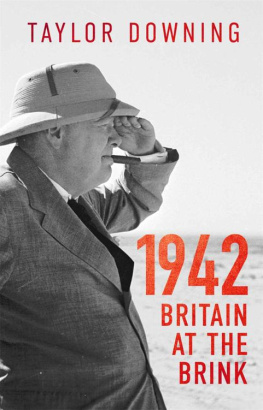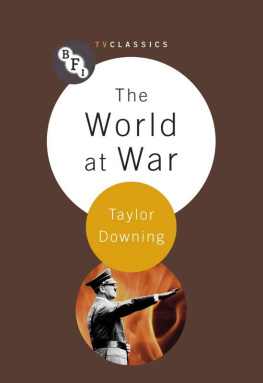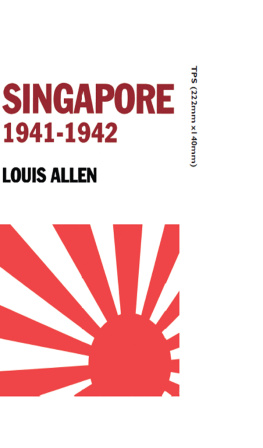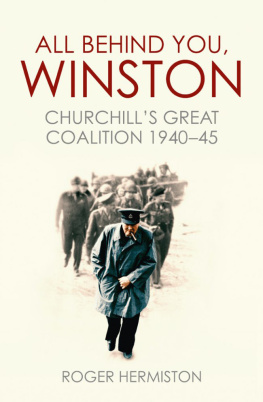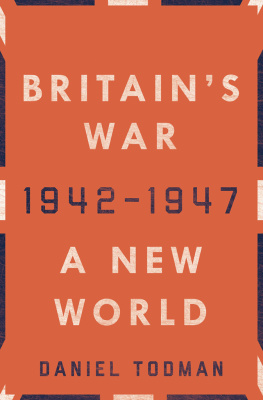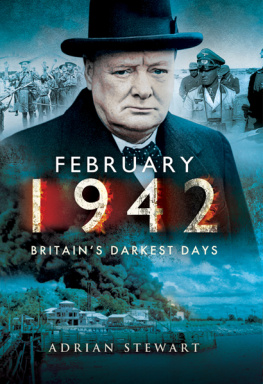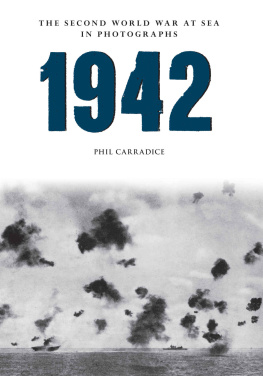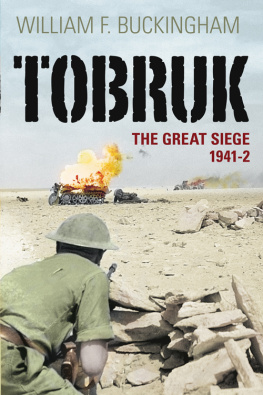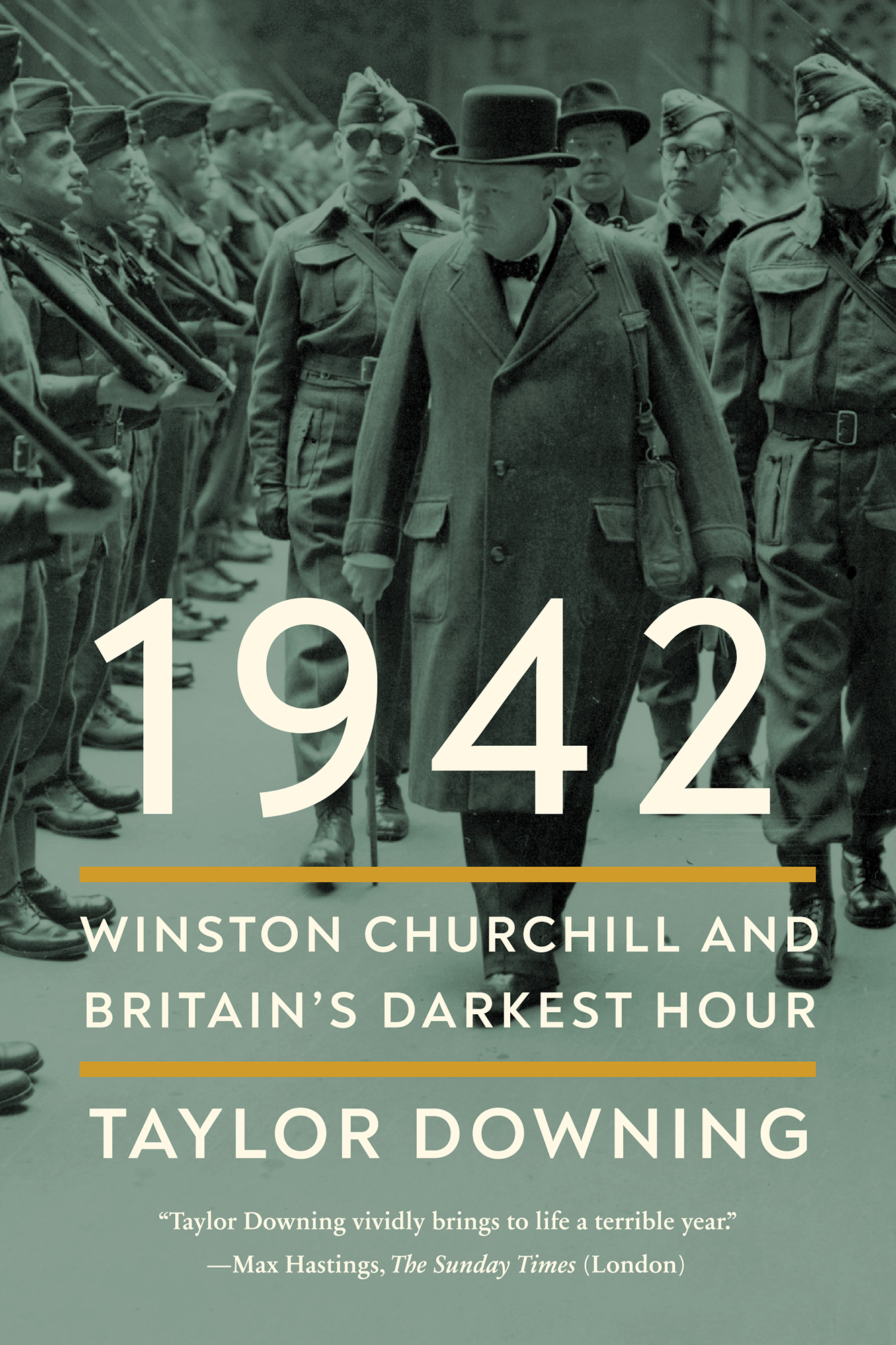Contents
Guide
1942
Winston Churchill and Britains Darkest Hour
Taylor Downing
Taylor Downing vividly brings to life a terrible year.
Max Hastings, The Sunday Times (London)
List of Maps
Prologue
Just before the declaration of war in September 1939, the government introduced a host of regulations in the Emergency Powers Act that began to affect almost every aspect of the lives of the British people. Normal life was effectively closed down for the duration of the war. The economy came under centralised governmental control which covered everything from determining the output of Rolls-Royce manufacturing plants to the management of ports and harbours, from dictating what farmers grew and produced to what was supplied to the corner shop in every high street or village (self-service supermarkets were unknown in the war years and most food shopping was done by women in their local butchers and grocery store). Companies were told what they could produce, what price they could sell their products for, and how much profit they could make.
At the beginning of the war there was panic buying on a grand scale. Anyone who could afford to hoard tinned goods, sugar or candles did so. There were stories of wealthy folk turning up in their cars and buying up almost the entire stock of small grocery shops. All of this of course hastened the introduction of food rationing, although the government hesitated at first fearing that the public would not accept centralised control and restrictions on the liberty of the individual. Every person was provided with a national identity card and a vast register was made of every street in the land listing exactly who lived where, even down to the pets people owned, so that in the event of their home being bombed rescuers would know how many people and animals they were looking for. Hospitals were emptied so that beds, even in maternity wards, could be kept free for the anticipated rush of air raid casualties. But these did not come for months. Travel was severely curtailed. Petrol was rationed at the beginning of the war but was still difficult to find for a private motorist without an official pass. Travel by railways, although theoretically possible, came to be immensely difficult as the need to move military personnel, goods and equipment became the first priority of the railway companies, causing regular cancellations and the revision of timetables. If you had to set out on a long-distance rail journey you had very little idea of how long it would take and when you would arrive. On the other hand, pubs and cinemas were open and unrationed. Pamphlets and posters everywhere told people what they could and could not do and tried to stiffen resolve and encourage cheerfulness. The whole system of dos and donts was policed by a vast bureaucracy of petty officials and local busybodies.
A Mass Observation diarist perfectly described one official who luxuriated in the importance of his work in the Food Office in Whitchurch, Hampshire. The diarist had to register her hens with the office on a form specially designed for this purpose, in order to obtain feed. His ruling principle, she wrote of the clerk, seemed to be You cannot be too careful. He would not allow us to help by filling in our own names, etc. So the official carefully wrote out the name and address several times as required by different pages of the hen form, each time checking it with the preceding name and address to ensure correctness. Eventually he was satisfied with his copying and put down his pen and picked up a red pencil. He then marked in red every page that needed to be approved. Putting down his pencil, he picked up a rubber stamp and pressed it on the egg page. He then produced a razor blade and slowly cut out the counterfoils that needed removing. Only then did he seem happy with his important work. All of this should have taken just a couple of minutes. But each applicant was waiting with more or less patience for about 20 minutes for his work to be finished to his satisfaction. The diarist concluded: I waited in all about one and a half hours. I am told that afternoon callers who arrived at 2 or after were not seen at all as the office closed at 3 p.m. punctually. Sadly there were no doubt thousands of such self-important officials across the land. But, broadly speaking, Britons accepted the need for regulations and controls, and adhered to them.
In the early stages of the war, the government was criticised firstly for not making sufficient preparations beforehand to supply all that would be necessary for, for instance, blackout curtains, sandbags and gas mask containers. Secondly, the government was criticised for its dithering. It would announce a new restriction and then when it proved unpopular it would withdraw or amend the restriction. Cinemas and sports venues were closed at the start of the war and then reopened again after a couple of weeks when it was realised what a disastrous effect this had on morale. Shops were ordered to shut well before the blackout and then it was announced they could stay open later. Hotels were commandeered for government departments to evacuate to and long-term residents were thrown out. Then the government officials moved somewhere else and the residents were allowed to return. The beginning of a national emergency was going to be a difficult time for any government, but it seemed particularly problematic for Neville Chamberlains administration.
Food rationing was not introduced until January 1940 but immediately it helped stabilise the process of shopping which in the first months of the war had been chaotic. Everyone was issued with a ration book and had to register with local retailers. Shop owners could then calculate how much of every rationed product they needed and everyone was assured of the supply of basics. According to the polls carried out at the time, most people thought the system, which supposedly applied equally to dukes and to dockers, was fair and reasonable.
In addition to the ration, people were encouraged to grow whatever they could for themselves. Gardens and parks across the country sprouted potato plants, cabbages, frames for runner beans and a variety of other fruit and vegetables. The number of allotments soared. Pig clubs were started up wherever there was an opportunity to keep a pig. And of course a black market soon developed, usually on a modest local scale although some big city networks were run by criminal gangs. Rogue traders and spivs could supply almost anything, at a price. And favouritism among shop owners led to the phrase under the counter becoming regularly used both as a term of endearment and gratitude, for those who benefited from something special being kept for them, and an expression of anger and resentment, for those who did not profit from such favours.
During the 1930s planners had become terrified by the prospect of the bombing of civilian centres. Prime Minister Stanley Baldwin had used the phrase the bomber will always get through, and there was universal fear that bombing would cause a massive loss of life and a likely collapse in civilian morale. To try to mitigate this, a nationwide blackout was ordered from the first day of war. At sunset the entire country was plunged into darkness, or at least that was the idea. Lights, it was believed, could help guide enemy bombers to their targets. So, no light was to leak out from any home, office or shop. Householders and shopkeepers had to go around their property every evening putting up specially made blackout curtains over every window, a laborious ritual. In some large offices this chore had to start mid-afternoon to be ready for the blackout. All street lights and illuminated signs were to be extinguished. Cars, buses, trains and trams had to mask their headlights and cover any interior lights. All of this was enforced by an army of local air raid precaution (ARP) wardens. The admonition shouted by an enraged warden, Put that light out!, was heard in every town and city of Britain. Some of these wardens were volunteers, genuinely fired up by the desire to do their bit for the community. Others were officious, bullying jobsworths who enjoyed exercising their authority over neighbours. Anyone in breach of the regulations could be fined by the police. Tens of thousands were.


